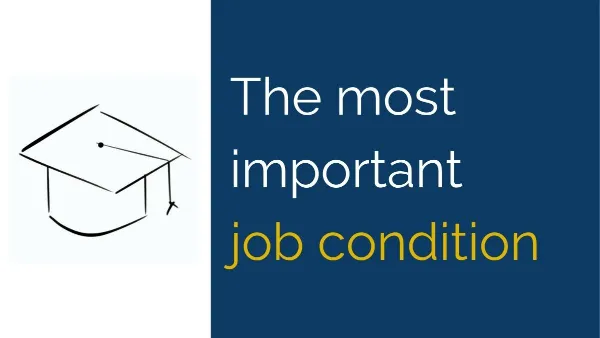After years of hard (and expensive) study, it’s tempting for new Physiotherapists to want to dive into full time work.
Whether it’s the enthusiasm of using what you’ve learned, the urge to start to clearing your student loans, or to just making sure you can actually find employment after 4+ years of study, there’s an urge to take the first job offered to you.
But the first job for a new Physiotherapist is so vital to the development (or early expiration) of your career that you need to search for one key feature of that job.

Believe it or not, salary is not the most important thing. It’s not even top 5. In fact, if a job is willing to pay a new grad some serious coin, you need to ask yourself WHY? Are the other aspects of the job so unappealing that they need to bribe new Physiotherapists to work for them?
The one feature to prioritise above all else is your Professional Development, and in particular having a great mentor in (or close to) your workplace.
A new Physiotherapist’s greatest asset
The first few years of your career are the ones that help you make sense of all that information you learnt that University.
You’d have to consider these years as almost as importance as your Physiotherapy degree itself because without the benefit of structured clinical practice, you’re a talking text book that make sense to nobody.
There was a Forbes et al paper published in 2020 that looked at what a new Physiotherapist is looking for in their mentor.
They found the most desired characteristics of an effective mentorship program are:
- accessibility of mentoring and support,
- the ideal mentor,
- individualised to the mentee and
- desire for self-determination.
Accessibility of mentoring and support
This seems to be the simplest of all the features, but the one most often lacking from good mentoring programs.
Having quick access to a mentor is the key. Not sitting down once a week with them, or getting feedback on a case long after that case has been discharged.
It’s the immediacy of the feedback that makes it so much more valuable – get some input while the ideas and patterns are still forming in your head and you’ll have a much better chance of learning from the experience.
The ideal mentor
The personal traits of the mentor are variable in many aspects, but there is some overlap in key areas,
The mentor should be “open, reassuring and provided direct guidance” (from page 9 of the original paper – note that the university may close access to this manuscript so the link may not work).
Being open and honest fosters a confident professional relationship.
Reassurance is another key trait as a new Physiotherapist needs to be encouraged when they’re on the right track and showing progress. There’s always plenty to criticise but they need to be encouraged in equal measure.
Lastly, providing direct guidance is necessary given the emerging nature of a new Physiotherapist’s thought process. Vague and reflective or overly philosophical responses can often add to the confusion and would be more appropriate for senior Physiotherapists.
Individualised to the mentee
This principle is consistent with any educational experience. We all learn differently, and the best approach needs to be customised to suit the individual.
This is where an experienced mentor is needed, as they recognise the differences in learning styles and can adapt their delivery to suit.
Desire for self-determination
In addition to providing direct guidance, being easily accessible and customising the mentoring style to suit the mentee, the desire for self-determination refers to the skill of the mentor to know when to step back and allow the new Physiotherapist to find their own path.
Continual guidance can have its pitfalls and may become stifling. Allowing the new Physiotherapist to form their own ideas and test some of their own theories can be very helpful. It’s the old “learning from your mistakes” concept, and it works.
Mentors must remember that they’re not just teaching Physiotherapy skills or clinical knowledge – they’re training the new Physiotherapist in “learning how to learn“.
It’s the skill of self-assessment and developing constructive processes to be able to learn from every situation, with or without your mentor by your side.

